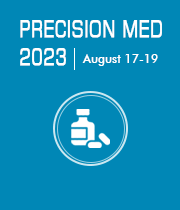Precision pharmacotherapy
Precision pharmacotherapy
To guide prescription selection and administration, precision pharmacotherapy includes the use of therapeutic drug monitoring, evaluation of liver and renal function, genomics, environmental and lifestyle exposures, and study of other unique patient or disease features. Precision pharmacotherapy is quickly evolving, and clinical pharmacists currently play a critical role in pharmacogenomics clinical implementation, education, and research applications. Pharmacists have long known that using a patient's unique traits to drive pharmacological decision-making might increase medication responsiveness and reduce drug-related hazards. The first patient-specific parameters utilized to personalize medication were age, weight, and dietary habits.
- Therapeutic Drug Monitoring
- Pharmacokinetics
- Individualized Drug Therapy
- Precision Pharmacotherapy
Committee Members

Bernd Blobel
University of Regensburg, Germany
Roy Gary Beran
University of New South Wales, Australia
Matthias Schwab
University of Tubingen, Germany 2023 Speakers Speakers

Thomas Webster
Interstellar Therapeutics, United States
Boris Tankhilevich
Magtera, Inc., United States
Isabella Friis Jorgensen
University of Copenhagen, Denmark


Title : The use of anti seizure medication therapeutic blood level determination to personalise the treatment of epileptic seizures especially in patients attending the accident and emergency department
Roy Gary Beran, University of New South Wales, Australia
Title : Personalized and precision medicine (PPM) can be established as a unique healthcare model through biodesign-driven and inspired biotech, translational applications. This approach aims to ensure human healthcare, wellness, and biosafety.
Sergey Suchkov, Institute for Biotech & Global Health of RosBioTech and A.I. Evdokimov MGMSU, Russian Federation
Title : Monitoring folds localization in ultra-thin transition metal dichalcogenides using optical harmonic generation
Ahmed Raza Khan, Australian National University, Australia
Title : A systematic review of regulatory approaches for Direct- To- Consumers (DTC) genetic testing
Kavitha Palaniappan, Duke-NUS Medical School, Singapore
Title : Regulatory framework of in vitro diagnostic and artificial intelligence for precision medicine
Pei Ting Sarah Chou, Regulatory Affairs Professionals Society, Taiwan
Title : Unraveling cancer stem cell signatures in circulating tumor cells of metastatic colorectal cancer: Investigating ALDH1A1 and the repurposing potential of disulfiram via scRNA-seq
Nurul Syakima Ab Mutalib, Universiti Kebangsaan Malaysia, Malaysia